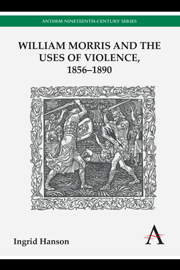Book contents
- Frontmatter
- Contents
- Acknowledgements
- Introduction Warriors Waiting for the Word
- Chapter One The Early Romances and the Transformative Touch of Violence
- Chapter Two Knightly Women and the Imagination of Battle in The Defence of Guenevere, and Other Poems
- Chapter Three Sigurd the Volsung and the Parameters of Manliness
- Chapter Four Crossing the River of Violence: The Germanic Antiwars and the Uncivilized Uses of Work and Play
- Chapter Five ‘All for the Cause’: Fellowship, Sacrifice and Fruitful War
- Afterword ‘Hopeful Strife and Blameless Peace’
- Notes
- Bibliography
- Index
Chapter Five - ‘All for the Cause’: Fellowship, Sacrifice and Fruitful War
Published online by Cambridge University Press: 05 July 2013
- Frontmatter
- Contents
- Acknowledgements
- Introduction Warriors Waiting for the Word
- Chapter One The Early Romances and the Transformative Touch of Violence
- Chapter Two Knightly Women and the Imagination of Battle in The Defence of Guenevere, and Other Poems
- Chapter Three Sigurd the Volsung and the Parameters of Manliness
- Chapter Four Crossing the River of Violence: The Germanic Antiwars and the Uncivilized Uses of Work and Play
- Chapter Five ‘All for the Cause’: Fellowship, Sacrifice and Fruitful War
- Afterword ‘Hopeful Strife and Blameless Peace’
- Notes
- Bibliography
- Index
Summary
In 1885, Morris wrote an editorial response in Commonweal to some comments made by ‘a friend’, who had written in, ‘deprecating a forcible revolution; it would be better, he says, to obtain justice without violence, lest we should have violence without justice.’ Morris does not wholly accept this view:
True; yet surely, whatever may be in the future, we have not far to seek to find violence without justice in the present. Do men choose a miserable life, or are they forced into it? No one wants violence if a decent life for everyone can be obtained without it. But it is to be feared that the natural sequence of enforced misery will be violent revolution. We ask our friend, is that the fault of the wretched, or of the system which has made them wretched?
Morris makes an important distinction here, between the hidden, coercive violence of ‘the system’ and the reactive violence of revolution. ‘The system’ that has made the poor miserable exercises what Pierre Bourdieu describes as ‘symbolic violence’, which is concerned with the social outcomes of coercive ideology, and results in both class inequality and physical suffering. Morris is willing to countenance violent revolution if necessary as both an inevitable result of and a necessary end to the misery and symbolic violence that he elsewhere attributes to ‘modern civilization’. This is a willingness borne out repeatedly in letters of the 1880s and 1890s, as well as in his fiction, poetry and political writing of this period.
- Type
- Chapter
- Information
- William Morris and the Uses of Violence, 1856–1890 , pp. 131 - 166Publisher: Anthem PressPrint publication year: 2013



